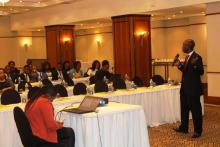Third Annual Pharmacy Research Conference held in Zambia
Lusaka, 25th July, 2016 – The third Annual Pharmacy Research Conference was held in Lusaka from 19th - 20th July 2016 under the theme ‘Reducing Disease Burden through Pharmaceutical Care and Research’. The conference was convened by the Ministry of Health in collaboration with the Centre for Infectious Disease Research in Zambia (CIDRZ) and was supported by the World Health Organization, Zambia AIDs Related Tuberculosis Project (ZAMBART) and other Cooperating Partners . The conference brought together close to 100 participants from government and private institutions including academia and the Pharmaceutical Association of Zambia.
The major objectives of the conference were to: Create a forum for sharing research papers and best practices in the pharmaceutical sector; find ways to assist the country find home grown solutions to existing health challenges; contribute knowledge for shaping pharmaceutical policies which will lead to a reduced disease burden. Zambia is under significant pressure to reduce the disease burden and pharmacists are called upon to contribute to and participate in discovering new evidence which can positively impact practice and improve patient outcomes. Research can contribute directly to the wellbeing of individual patients, the community and the public health service through shaping the way medicine is practiced and through advances in medicine and patient care.
The major themes which were discussed at the conference include: pharmacovigilance; improving commodity security; patient satisfaction with pharmacy services; prescribing patterns; community ART; national supply chain; rational use of medicines and data management. The research studies which were presented include: pharmacovigilance training in pre-service undergraduate health professions programmes; pharmacovigilance (By the Zambia Medicines Regulatory Authority National Pharmacovigillance Unit-reporting sequence and Pharmacovigilance at Levy Mwanawasa Hospital); patients’ satisfaction with outpatient pharmacy services at the University Teaching Hospital and Ndola Central Hospital; level of adherence to tuberculosis therapy in adult tuberculosis patients at Chilenje clinic in Lusaka; rational use and availability of antimicrobials at primary level health facilities; national supply chain challenges; WHO guidelines; gender differences and CD4 immunological failure among human immunodeficiency virus treatment naïve patients on antiretroviral therapy at Itezhi-tezhi District Hospital and management of data on active ART patients; and assessing prescribing patterns and medicine use at University Teaching Hospital a study which was supported under the EU/ACP/WHO Renewed partnership.
The recommendation from the conference are as follows:
- In-house capacity building and continuous professional development is needed to improve rational use of medicines particularly to address the high antibiotic use, low dispensing times, low patient’s medication use knowledge which were identified in some of the research studies. It is also key to improve ratios of pharmacists at health facilities and to ensure patients are properly educated on how to use prescribed medicines. More studies are needed to identify the reasons for the high rate of antibiotic use at the national hospital in and Out Patient Departments.
- The conference identified the need to further strengthen Pharmacovigilance in Zambia in order to safe guard the health of the general public. As part of strengthening Pharmacovigilance, there is need to improve pharmacovigilance reporting through training of health workers and expanding the reach to private institutions and pharmacy outlets.
- In order to address the immunological failure of patients who are on ART, which is more common in males as shown by one study conducted at at Itezhi-tezhi District Hospital, the conference recommended strengthening campaigns that promote early HIV diagnosis in the district. It was also observed that there was need for extending similar studies to other districts to ensure better understanding of this phenomenon
- The Centres for Infectious Diseases Research in Zambia is involved in Community ART. The information generated should be considered for policy development and improving programme implementation instead of initiating new studies. However, there is need to assess the workload of pharmacists in areas which are implementing community ART.
- The conference also highlighted the need for expanding ways of improving commodity security through regulation harmonization which would facilitate pooled regional procurement. Health financing mechanism was also discussed as one of the avenues to improve commodity security through sustainable internal resource mobilization as part of the Access to Medicines 2030 agenda.





